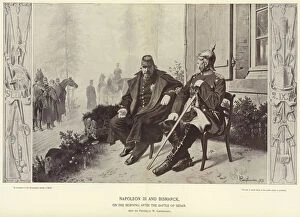Napoleon 3rd Collection (#8)
"Napoleon III: A Controversial Figure in History" Napoleon III, the enigmatic ruler of France during the Second Empire (1852-70
For sale as Licensed Images
Choose your image, Select your licence and Download the media
"Napoleon III: A Controversial Figure in History" Napoleon III, the enigmatic ruler of France during the Second Empire (1852-70), evoked mixed emotions among his subjects and critics alike. From political cartoons to historical paintings, various depictions shed light on his reign and its impact. In one satirical cartoon titled "Poor Taxpayer. . Thank the Empire, " published in Le Sans Culotte in 1879, Napoleon III's costly wars were criticized. The image highlighted the burden placed on ordinary citizens due to extravagant military expenditures. Another artwork capturing public sentiment was an engraving depicting the Paris Salon exhibition of 1865. Here, viewers are shown observing Édouard Manet's scandalous painting "Olympia. " This piece symbolized a clash between traditional values and emerging artistic movements under Napoleon III's rule. A watercolor titled "Monsieur Prudhomme and Napoleon III" portrayed a common man named Monsieur Prudhomme engaging with the emperor. This work reflected societal tensions as well as criticisms directed towards Napoleon III's policies. The emperor himself also dabbled in artistry, evident through his engraving called "Le nouveau Don Quixote. " It depicted Marianne guarding Porte de Paris while he assumed the role of Don Quixote. This portrayal showcased his desire for grandeur and ambition despite facing ridicule from some quarters. Political events further shaped perceptions of Napoleon III. An illustration from 19th-century print captured Berezowski's attack on Tsar Alexander II in 1867, highlighting international conflicts that influenced European politics during this era. One significant moment was Napoleon III’s triumphant entry into Paris in 1852 following his coup d'état. An engraving immortalized this event, emphasizing both support for him and skepticism about his intentions among French society at large. Family played a crucial role too.



